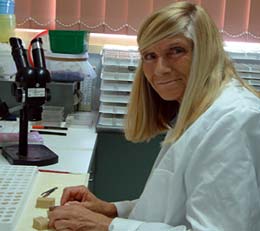New technology targets pesticide-resistant insects
Note: This content is stored on an archive website and may not be current or accurate. Contact us to clarify.
Australian and UK scientists have developed a technique to effectively control the 'super pests' that are highly resistant to pesticides used on important food and fibre crops worldwide.

Principal Research Scientist, Dr Robin Gunning
The technique, patented by the NSW Department of Primary Industries and Rothamsted Research (UK), has proved effective against key insect pests that have evolved resistance to pesticides used in many agricultural industries, including horticulture and field crops.
Results of the research including details of scientific trials conducted in Australia, Spain and South Africa, are being presented today (Friday October 8) at the 2nd European Whitefly symposium in Croatia.
NSW DPI Principal Research Scientist, Dr Robin Gunning, said the technique was effective on insects that have developed a metabolic resistance to pesticides.
These include the cotton bollworm, cotton and silver leaf whitefly, and diamondback moth.
The invention relies on the use of enzyme inhibitors such as piperonyl butoxide (PBO), a natural substance derived from sesame oil.
Dr Gunning said previous efforts to use PBO failed, because the pesticide was inactivated by the insect's metabolic enzymes before the inhibitor had a chance to work.
Dr Gunning and her co-inventor, Dr Graham Moores from Rothamsted, designed the technology so that it incorporates a time delay mechanism.
Using novel micro-encapsulated formulations, they are able to deliver the enzyme inhibitor and the pesticide in a single dose. Firstly, an insect's resistance mechanisms are deactivated and then, four to five hours later, the insect is exposed to the pesticide.
Dr Gunning said the technology had been found to be effective in some of the world's resistance 'hot spots'.
"In NSW and Queensland, we conducted trials against the major pest of cotton, the cotton bollworm (Helicoverpa armigera) and silverleaf whitefly (Bemisia tabaci), and achieved virtually 100% mortality using pesticides that normally do not work.
"Similar results were obtained from trials in southern Spain with highly resistant white flies (Bemisia tabaci)."
Since resistance to pesticides first emerged in insect pests, more than 500 species of insects and mites have developed tolerance to chemicals - including pesticides regarded as being environmentally benign.
Dr Robin Gunning said the technology is likely to be of particular importance to the third world, where pesticide résistance and chemical overuse on crops is a major problem.
"It also has potential for public health programs such as malaria control."
An Italian company is working on a commercial release for a formulation designed on this technology which, in the first instance, will be available for use on cotton. It is expected subsequent formulations will be developed for other agricultural applications.
Media contact: Joanne Finlay, Science Communication Specialist on (02) 6391 3171 or 0428 491 813.

